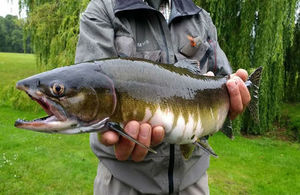Have you caught a Pacific pink salmon in England?
The inland and coastal waters of England are home to a host of different fish species, but we can now add another name to that list, the Pacific pink salmon.

A Pacific pink salmon caught in an English river. (Image courtesy of Ness District Salmon Fisheries Board)
Up until recently, catching a Pacific pink salmon was as rare as netting a red herring. However in 2017 unprecedented numbers of this species were reported within inshore coastal waters and rivers in Scotland and England.
In Scotland, pink salmon were found to have spawned successfully producing viable eggs that hatched into fry (juvenile fish).
Seven pink salmon were subsequently recorded by anglers in or close to English rivers. Four of which were seen in the North East of England including the River Wear, River Tyne and the River Coquet with other specimens recorded as far west as the Hampshire Avon in Dorset.
Pacific pink salmon were originally introduced to a number of Russian rivers in the 1960s and have slowly spread westwards colonising additional rivers in northern Norway.
Owing to the two year life cycle of this species, 2019 will be the first year that we can expect to see these fish return in numbers.
If anglers or commercial netsmen do catch a Pacific pink salmon then the Environment Agency would love to hear from you, as we are interested in monitoring their numbers and distribution at a regional and national scale.
This year so far, there have been seven confirmed incidences of pink salmon across the UK and the Republic of Ireland - one in Wales, one in Ireland, three in Scotland and two in a T net set to catch sea trout off the Northumbrian coast.
These numbers accompany the earlier sightings recorded back in 2017.
Jonathan Shelley, Net Fishery Programme Manager at the Environment Agency, said:
From examining the specimens that were captured and recovered two years ago by the Environment Agency, no notable disease or novel parasites were detected. However, we need to remain watchful and continue to investigate the possible risk of undesirable consequences arising from the presence of this species.
It is anticipated more pink salmon will be observed over the coming weeks and fisheries managers, anglers and netsmen are requested to remain vigilant, particularly if fishing in the lower reaches of the river systems.
Fisheries management organisations across the UK are sharing advice to ensure that any appearance of pink salmon in England can be monitored and managed appropriately.
Simon Toms, National Fisheries Management Team Leader for the Environment Agency said:
Wild Atlantic salmon stocks are already under great pressure from a variety of sources. The introduction of novel parasites or diseases from invasive species, such as Pacific pink salmon, could potentially represent an additional risk to the viability of the species.
We therefore want to better understand the immediate risk that pink salmon could represent to our important wild salmon stocks. We are urging anglers to report the capture of all pink salmon to us [Environment Agency] as soon as possible after capture. These fish could turn up in any river in England but are most likely to be found in rivers in the North East and North West of England.
The Environment Agency has some helpful advice about what to do if people catch or observe a Pacific pink salmon.
Please record the following details:
● A clear photograph
● Date of capture or sighting
● Location of capture (grid reference if possible) and details of the site
● Method of capture
● Sex of fish
● Take a scale sample from the fish captured
● Freeze and store the fish whole as soon as possible after capture
● Note the weight and fork length measurement of the fish
Important additional note for all anglers and migratory salmonid netsmen:
If you hold a salmon rod or net fishing licence and you are confident that you have caught a Pacific pink salmon, the fish should be humanely despatched and retained. Please do not return the fish to the river or sea.
This guidance also applies to rivers with mandatory catch and release for Atlantic salmon or trout and coarse rod licence holders. In either instance, it is important that if retaining a pink salmon, please call the Environment Agency immediately on 0800 80 70 60 to report the capture and retention of this fish. The capture will then be formally logged. If it is not possible to make this call the fish should be released back to the river alive.
If you are unable to retain whole specimens, please ensure that scales and fin clips (adipose or a clip from any other fins) are collected, as well as a sample of dorsal muscle tissue (at least 2cm x 2cm) if this is possible.
This advice also relates to fresh, dead fish found in English rivers. If you have permission from the owner, fish can be stored in a suitable, sealed plastic bag and stored in a standard domestic freezer before collection. Please also store the capture details together with the fish in a separate sealed plastic bag if at all possible.
Please also be vigilant for any early or unusual spawning activity particularly during August and September when pink salmon are most likely to be active in spawning areas.
The Environment Agency has produced a useful guidance factsheet with all of the advice needed for individuals who catch a Pacific pink salmon.
If people would like to request a copy of the advisory PDF please email [email protected]
Alternatively if you wish to report anything to the Environment Agency or gain specialist advice please call our incident line on 0800 80 70 60.